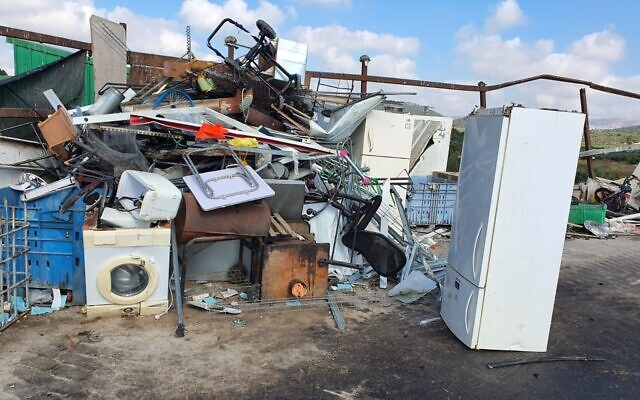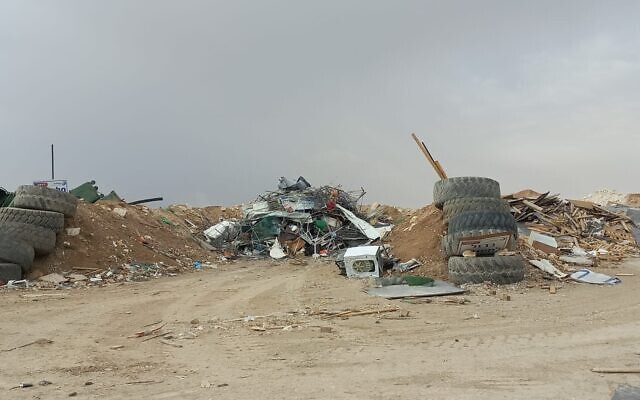Ministry finds most electronic waste treatment sites are violating environment laws
Inspection follows March warning to scrapyards that they could face $180,000 fines if found to be working without the necessary equipment and facilities to minimize pollution
Sue Surkes is The Times of Israel's environment reporter.

The Environmental Protection Ministry announced Sunday that it had discovered suspected violations of the electronic waste treatment law in 28 out of 43 sites visited last week.
In March, the ministry reiterated the requirements of the law for the many transit and sorting stations and treatment facilities that operate countrywide. It warned the yards that they could be fined NIS 649,330 ($180,000) if found to be working without the necessary equipment and facilities to protect the environment.
E-waste, which includes everything from large domestic appliances and batteries to smartphones, contains toxic materials such as lead, mercury, cadmium and flame retardants. It represents just three percent of all refuse but creates 70 percent of waste-generated pollution.
During an inspection swoop last week, the ministry checked whether electronic equipment was present at the sites or if the sites illegally refused to accept it. If there was electronic waste, they checked whether it was separated from other kinds of waste; whether it was stored in a sealed confinement to prevent toxins from leaking into the ground; whether the site had its own, separate drainage system; and whether the equipment was protected from rain.
The inspectors also checked whether there were refrigerators at the scrapyard, since these appliances need special treatment to ensure that when taken apart, global warming gases within them are not released into the atmosphere. They examined how the fridges were being handled, and how parts that had been removed from fridges were being stored.
They checked that business licenses were up to date, and that all electronic equipment was registered — data that is critical for measuring whether the electronics industry is reaching its recycling targets. And they reviewed where the waste was being sent to. Today, much of it ends up in landfills or in the hands of West Bank Palestinians who burn it to get at the parts, causing serious air, soil and water pollution.
According to a 2022 Environmental Protection Ministry report relying on figures from 2020, some 155,000 tons of electronic waste are produced in Israel each year, with just under half — some 70,000 tons — being recycled.

In January, Electra, one of Israel’s major suppliers of electrical home appliances and air conditioners, teamed up with All Trade to open a new recycling factory for large domestic appliances just outside Sderot in southern Israel. All Trade is an Israeli recycling plant for small electronic appliances based in an industrial site in the West Bank.
There are still no regulations or standards defining what electronic devices should be recycled and how. Electric car batteries are still excluded from the law. Two state-appointed waste corporations — the Israel Electronics Recycling Corporation, better known by its Hebrew acronym M.A.I., and Ecommunity — do not work well together, and some local and regional councils have not yet contracted with either for the collection of this kind of waste.
Furthermore, while both Israeli and Palestinian law systems ban the transfer of Israeli waste to the West Bank, such shipments are ongoing, as a Times of Israel investigation showed in January 2022.
Some Israeli companies and individuals save thousands of shekels or even make a profit by sending their waste to smugglers who sell it on to Palestinian scrapyards. Last year, the Environmental Protection Ministry estimated that 20,000 to 50,000 tons of e-waste likely reached the West Bank, passing through unregulated hands or ending up in landfills.
The burning of such waste seriously endangers public health on both sides of the Green Line. In the Lachish region, residents complain of choking smoke from e-waste fires burning around the Hebron Hills just a few kilometers away in the southern West Bank.
Stores that sell large domestic appliances such as washing machines and fridges are obliged to take an old appliance of similar size and weight from the buyer’s home, without charge, regardless of where it was acquired. Used batteries must be accepted by any store, whether they were purchased there or not.









